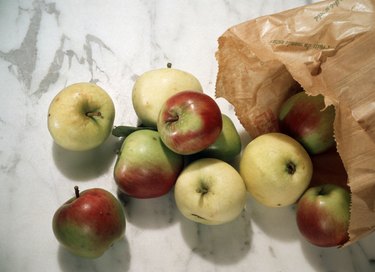
Remember the old saying "one bad apple spoils the bunch?" As it turns out, that's true — apples make other fruit ripen faster, which is why they shouldn't be stored together. Bananas, mangoes, kiwis and other ethylene-producing fruits may cause early spoilage and increase food waste.
Tip
Ethylene-producing fruits, such as apples, bananas, peaches and honeydew melons, should not be stored next to avocados, lemons, grapes, onions and other fruits or vegetables that are sensitive to this compound. Also, you should never store ethylene-producing fruits together.
Video of the Day
Ethylene Gas and Fruit Ripening
There's a reason why you should keep apples or bananas separate from other fruit. These two — and others — produce large amounts of ethylene gas, the so-called "fruit ripening hormone." As they reach maturity, their ethylene levels increase, according to the University of Maine Extension.
Video of the Day
McIntosh apples, for example, are major ethylene producers and ripen faster than most fruits. The same goes for Early Golden plums, but not for Shiro plums, which typically ripen at a slower pace.
Consumers don't have the equipment and tools needed to measure ethylene levels. What they can do is to check the fruits for any signs of spoilage, such as foul odors, mold, mushy spots or changes in color and appearance.
Also, beware that ethylene-producing fruits may cause premature ripening in vegetables, too. The Produce for Better Health Foundation recommends storing them away from ethylene-sensitive veggies and legumes, including:
- Asparagus
- Cauliflower
- Broccoli
- Chili peppers
- Cucumbers
- Leeks
- Kale
- Beans
- Potatoes
- Mushrooms
- Sweet peas
All fruits release ethylene gas in varying amounts. Apples make other fruits ripen faster because they produce ethylene in high amounts. According to a December 2015 review featured in Plant Physiology, plant hormones may play a role, too. Abscisic acid (ABA), for example, seems to accelerate the ripening process, whereas auxin, another plant hormone, promotes fruit growth and development in early stages.
Don't Store These Fruits Together
Now that you know about the role of ethylene gas in fruit ripening, it's time to organize your refrigerator. This will not only help reduce food waste but also ensure that your fruits are vegetables are safe to eat.
As mentioned earlier, the riper a fruit is, the higher its ethylene levels. This compound can easily spread to other fruits and veggies, causing them to ripen faster — and eventually rot. On top of that, some plants are sprayed with ethylene gas before harvesting to accelerate ripening, states the International Service for the Acquisition of Agri-biotech Applications (ISAAA).
Apples, pears, bananas, mangoes, plums, nectarines, honeydew melons and other fruits all release high amounts of ethylene, as reported by the Produce for Better Health Foundation. That's why you should store them separately. For example, you may put apples in a medium bowl bag and bananas in a different bowl — and refrigerate them.
As a rule of thumb, ethylene-producing fruits like those listed above should not be stored next to ethylene-sensitive produce, such as:
- Avocados
- Grapes
- Watermelon
- Lemons and limes
- Cantaloupe
- Peppers
- Onions
- Cucumbers
Some fruits, such as apples, bananas, kiwis and other major ethylene producers, are highly sensitive to this compound. For this reason, it's not recommended to store apple and banana together, for instance. Beware that storing ethylene-producing fruits in bags and sealed containers will trap the gas and speed up ripening, warns the UC San Diego Center for Community Health.
Not all fruits and vegetables are sensitive to ethylene, though. Cherries, pineapples, garlic, grapefruit and blueberries can be safely stored together or next to those that produce this gas. The same applies to white potatoes, but not sweet potatoes.
Another important aspect is the refrigerator temperature. Bananas, for instance, should be stored in the fridge at 58 Fahrenheit to stay fresh longer. Refrigerate blackberries, strawberries, raspberries and blueberries at 31 F, and cranberries at 36 F. Tropical avocados preserve their freshness when stored at 50 F. If you've just bought a bag of apples, refrigerate them at 30 F.
For an idea as to where in your fridge to store these items to ensure ideal temps, it's good to understand typical temperature variations in the average refrigerator. Typically, the bottom of the fridge is the coldest spot, while the top shelf maintains the most consistent temperature. The door tends to be the warmest, since it's opened frequently and closest to the outside air.
Overripe fruits should not be discarded unless they have a mushy texture or signs of mold. Oranges, lemons, grapefruit and other citrus fruits, for example, have a firm skin. If you notice moldy spots or bruises on their skin, you can simply remove the peel and eat them, as recommended by the Greater Chicago Food Depository. Just make sure their flesh is intact.
- University of Maine: "The Role of Ethylene in Fruit Ripening"
- Produce for Better Health Foundation: "About The Buzz: Certain Fruits and Vegetables Should Not Be Stored Together?"
- Plant Physiology: "Ethylene Control of Fruit Ripening: Revisiting the Complex Network of Transcriptional Regulation"
- Frontiers in Plant Science: "Transcriptomic Analysis in Strawberry Fruits Reveals Active Auxin Biosynthesis and Signaling in the Ripe Receptacle"
- ISAAA: "Delayed Ripening Technology"
- UC San Diego Center for Community Health: "Ethylene in Fruits and Vegetables"
- Ethylene Control: "Ethylene Production/Sensitivity Chart"
- Greater Chicago Food Depository: "Salvageable Fruit and Vegetable Guidelines"